Peter MALONE
Saturday, 18 September 2021 19:32
Murder By Decree
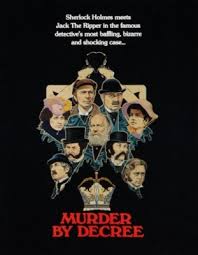
MURDER BY DECREE
Canada/UK, 1978, 112 minutes, Colour.
Christopher Plummer, James Mason, David Hemmings, Susan Clark, Anthony Quayle, John Gielgud, Frank Finlay, Donald Sutherland, Genevieve Bujold.
Directed by Bob Clark.
The Sherlock Holmes genre continues its '70s popularity with this elegant and multi-starred (John Gielgud and Genevieve Bujold stand out) Canadian/British production. It has a most genial, feeling Holmes in Christopher Plummer and a pleasantly obtuse British Watson in James Mason. Their quest is Jack the Ripper and John Hopkins' screenplay draws on recent theories linking the murders to royalty, but here we have a political cover up situation and democratic dialogue that echoes the '70s. 19th century London is excellently recreated, the murders are horrible and the web difficult to untangle. However, there is a long explanatory sequence to finish and thriller and Holmes fans should be well satisfied.
1. The appeal of Sherlock Holmes and Dr. Watson? The widespread interest in the '70s? The atmosphere of the 19th and 20th centuries? Sherlock Holmes and Watson embodying the century, England? His work in detection, the popularity of the detective? The imagination exercised over Holmes and his cases? His status, symbolism?
2. The film as a Canadian/British co production? Sets, atmosphere, music? The contribution of the stars?
3. The imaginative screenplay, using Conan Doyle's characters, the blend with Jack the Ripper? Inventiveness and the themes of the '70s? violence, politics and cover-ups, sexuality, integrity?
4. The perennial attraction of Jack the Ripper? Horror, revulsion. fascination? The theories on his identity? The link with royalty and English government? The background of 19th century English repression, violence? Jack the Ripper as an avenging angel and the other theories? Their use here?
5. The initial focus on the Ripper murders, their ugliness and visual impact? The pattern for introducing them in the film? The slum area of London, the dark, the horse and carriage, the prostitutes, the close-ups? The background of the medical skill in the slashings? The two responsible and their madness? Their enjoying the killing? The final confrontation and exposure, the fight with Sherlock Holmes to the death?
6. The explanation of the theory ? the Duke of Clarence, marriage, the illegitimacy of his child, Catholicism. the Masons? The hiring of professional killers? The information given, the explanation at the end? Murder by decree, the cover up?
7. The '70s tone about politics, expediency? The cover-up from polite and elegant English gentlemen? John Gielgud as presenting the Prim Minister and his articulate persuasion? The English settings and the politics? The involvement of the police, the Masons? The knowledge of politicians? whether Queen Victoria knew?
8. Holmes and Watson as portrayed by Christopher Plummer and James Mason - humanity, their skills at detection? Christopher Plummer as humane, not pompous? Cultured., his playing the violin, his skills? His pursuit of criminals, encountering dangers? The clash with Sir Charles? The comparisons with Foxborough? The search for Mary and its dangers? The comparisons with Scotland Yard and Inspector Lestrade? The search for Annie and his being moved with compassion? The sympathy of their encounter? His further motivation for pursuing the investigation even in danger of his life, the final confrontation with Foxborough and his opposition to him.. the fight with the murderers? The explanation by the Prime Minister and Sherlock Holmes giving his pledge to secrecy? Holmes as hero?
9. The support of Watson with his bluff but obtuse loyalty, practical help, theorising, non-comprehension? A chorus for characters and events?
10. Lestrade and Scotland Yard and the ordinary competence of the police? Sir Charles and his power, influence, taking people off cases, the Masonic background and his being tricked by Holmes? The final confrontation of Holmes with the backing of the Prim Minister and the Foreign Secretary?
11. Foxborough as a detective, his helping Holmes, his knowledge of the details of the plot, his revolutionary and egalitarian background? The final hostility towards Holmes? The accident of his death?
12. The presentation of the women - the world of the prostitutes, their talk, their meal together, their attending the funeral? Suspicions? Mary and her co-operation? The chase, her being kidnapped, her fears, the ugly violence of her death? Holmes and the effect on him?
13. Genevieve Bujold's portrayal of Annie, in the asylum, her being imprisoned there unjustly, her insane behaviour, her trying to hold on to her sanity? The flashbacks? Her love for the Duke, the love for her baby? Telling the truth to the women and thus being the cause of their deaths? Her fear in the asylum? The way she had been used by the government? Her being victimised? Her touching the audience and Holmes?
14. The portrayal of the assassins and their madness?
15. How well did the film work as a detective story - the need for a long explanation sequence? The personalising of Sherlock Holmes and his crime detection? A story of England in the 19th. century with social and political background?
Published in Movie Reviews
Published in
Movie Reviews
Tagged under
Saturday, 18 September 2021 19:32
Murder By Death
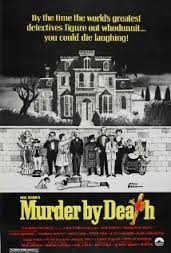
MURDER BY DEATH
US, 1976, 95 minutes, Colour.
Eileen Brennan, Truman Capote, James Coco, Peter Falk, Alec Guinness, David Niven, Peter Sellers, Maggie Smith, Nancy Walker, Estelle Winwood, Elsa Lanchester.
Directed by Robert Moore.
Neil Simon is master of witty lines and seeing humour in most conventional situations and relationships. Here he keeps his wit but indulges happily in some outlandish parody of the murder mystery genre and its practitioners, especially Agatha Christie (Poirot and Miss Marple - Marbles!) and Dashiell Hammett (Thin Man, Wife and Dog and Sam Spade - Diamond!) plus Charlie Chan (alias Peter Sellers) for good measure and a very murderable Truman Capote. Familiarity with the conventions will help the laughter enormously, especially the outlandish confession sequence (outstripping the Orient Express equivalent) and the resolution sequence with its multiple solutions and culprit unmaskings to end all unmaskings. Excellent froth.
1. The enjoyment value of the film, the stars, the satire and parody, the comedy?
2. The purpose of making this film: homage to 'the detectives' and 'the detective story' and their conventions, satire and parody? The satisfactory blend of both?
3. The nature of the homage, acknowledgement of audience interest, entertainment value, the genre and the conventions, victim, suspects, detectives, clues and sleuthing? Audience involvement in a mystery, its clues and solution? The characters involved? The Agatha Christle and Dashiell Hammett characters? Imitation and homage?
4. The nature of the parody: the implausibility of the initial situation and invitation, the murderous threats, the house and its set-up, the blind butler, the clues, the detective types, the funny situations?
5. The importance of the setting: the parody of the invitation, the dinner, the house and everything that belonged to it, the screaming doorbell, the lights, the murder attempts, the gadgets and the poke at electronics?
6. The importance of the assembly, the various encounters with the detectives, the house and the disappearance from the rooms, the dinner, the appearance of the host? Most of the action taking place in the room, sharing clues, the motivation of the money to solve the mystery?
7. The effect of the murder and the fact that the host had predicted his murder? The humour and the far-fetched nature of the revelation of connections of all with the victim? The satire in the various threats of death in the bedrooms? The humour in the ways of survival? The various solutions as proposed, the various unmaskings and the literal satire on the unmasking of the villain?
8. The fact that Truman Capote was the host, his attempt at murder, eccentricity? The significance of his death, the fact that the cook did it?
9. The comedy with the butler: Alec Guinness' style, the humour on his blindness, the suave English style, the lack of communication with the cook, his murder and disappearance, his role in the solution and the fact that he was only a mask? Alec Guinness' comedy in mimicking the various suspects he was presented as?
10. The role of the cook, and the revelation of her survival?
11. The satire on Hercule Poirot? His assistant? His fastidiousness, food, involvement with the clues, with the victim? He and his companion being crushed? What characteristics of Poirot were being satirized?
12. The satire on Miss Marple and her nurse? A robust Miss Marple, the nurse and her flirting?
13. The satire on Charlie Chan in the person of Sidney Wang? Peter Sellers' style of comedy? His son? The threat of death with the snake and their survival?
14. The parody of 'The Thin man' and his wife? Dick and Dora and their elegant style? The dog? The threat of death and Dora's possible death?
15. The satire on the American detective, Sam Spade & the Humphrey Bogart style? Tess Skeffington the faithful assistant? Her style and her having all the facts at hand etc.? The satire on the masculinity of the American detective? Peter Falk's style of comedy?
16. The film as a piece of entertaining froth? But a piece of Americana? Poking fun also at audience expectations?
Published in Movie Reviews
Published in
Movie Reviews
Tagged under
Saturday, 18 September 2021 19:32
Murder at the World Series
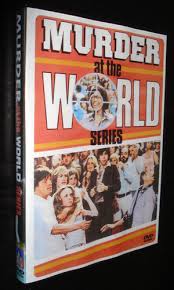
MURDER AT THE WORLD SERIES
US, 1977, 100 minutes, Colour.
Lynda Day George, Murray Hamilton, Karen Valentine, Janet Leigh, Gerard S. O’ Loughlin, Michael Parks, Hug O’ Brian, Nancy Kelly, Joseph Wiseman, Bruce Boxleitner.
Directed by Andrew V. Mc Laglan.
Murder At The World Series is a routine disaster film. It highlights a young kidnapper (jealous of people chosen for a baseball team) who kidnaps the wrong girl, is responsible for her death, is chased by the police and finally caught. There is a cross section of guest characters bringing all kinds of 'human interest'. The film is a telemovie and so the characters are sketched for immediate impact and for easy identification of emotional crises. The performances are only adequate. A comparison would be the disaster thriller set during a football match, Two Minute Warning. Thefilm is directed by veteran action director (with so many films starring John Wayne and James Stewart) Andrew V. Mc Laglen.
1. An entertaining thriller? For an American audience, overseas audience?
2. The conventions of the telemovie? the establishing of the basic situation, the melodrama, the disaster for the public? The establishing of a wide range of conventional guests, who are implicated in the melodrama? How well did the film establish these characters, gain audience interest in and identification with them? The build up of the disasters for a home viewing audience?
3. Photography, the settings in the Superbowl at Houston? The focus on baseball playing? Affluent hotels contrasting with shabby vans and hotels. The Governor and parties, the ticket agencies for finals?
4. How plausible the plot - the basic kidnapping and the jealousy and Cisco? His kidnapping the girl and holding her? Her accidental death and his snapping? His final jealousy and destructiveness with the explosives? The picture of the police and their use of television, detection work, investigations, final confrontation? The picture of the players and the various members of the team? The subplot of the Governor and the film star and her attempted suicide? The ticket assistant and her relationship with the policeman, her impending death? Lois and Marshal and his place on the team? The subplot of Alice winning the trip and her relationship with Druckman? How well did the screenplay intertwine these characters and themes?
5. Cisco and the opening, his jealousy, his plan, the tape? His getting the groupie girl ? and the discussions with her, establishing a relationship, the story of her father (and his later being notified of her death), her fear of death, the accident of her death after his mistake with the car keys etc.? His vengefulness at the end, his capture? The credibility of this kind of kidnap and killing?
6. The presentation of the world of baseball players ? the various characters, competitiveness, the build-up to the final game? The ticket-selling, the celebrities present?
7. The insight from the subplots - the suave Governor, Margo and her going to the World Series, her rejection at the party, attempted suicide, her glamorous leaving hospital, the public relations work of her assistant? Karen and her coming from the doctor, her friendship with the policeman, ringing him in the morning, her being inspired to try for some cure by his confrontation with Cisco? Lois and Marshal and their marital relationship, Marshal and his relegation to the sidelines, his final success? Alice and Druckman and the romance for the middle aged? Murkison and the frantic running of the business and P.R. side of the match?
8. Basic human themes - at television series level? Audience interest, response, empathy with the human issues? Excitement at the melodrama?
Published in Movie Reviews
Published in
Movie Reviews
Tagged under
Saturday, 18 September 2021 19:32
Muppets Take Manhattan, The
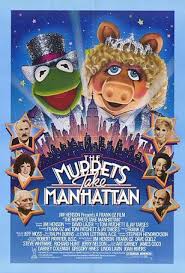
THE MUPPETS TAKE MANHATTAN
US, 1984, 94 minutes, Colour.
Art Carney, James Coco, Linda Lavin, Dabney Coleman, Gregory Hines, Joan Rivers, Elliot Gould, Brooke Shields, Liza Minnelli, John Landis. Voices: Jim Henson, Frank Oz.
Directed by Frank Oz.
The Muppets Take Manhattan is the third of their full-length features. This time the film is directed by Frank Oz (responsible for Miss Piggy). He co wrote the script. All the expected ingredients are there, the whole range of characters popular from the series and the films as well as an attractive group of humans (plus some villains).
The screenplay is more or less a pastiche parody of all those Babes On Broadway musicals of past decades. 'The show must go on'. There is some satire on Broadway, on New York lifestyle, on Madison Avenue agents. Miss Piggy is enabled to spy but finally marry Kermit. Kermit is allowed to have a bout of amnesia with consequent humorous results. There are songs, lavish production numbers, smart and witty dialogue. As well as all the things that Muppet fans hope for.
1. An enjoyable Muppet movie? The popularity of the Muppets as characters: appearance, voices, mannerisms, expected ways of behaviour?
2. The technical qualities of the film ? the production of the Muppets, the puppetry, the gestures and voices? Their acting together and the quality of the voices? Audiences accepting them as real characters?
3. The title and the echo of all those stories about hopes for breaks on Broadway?
4. The outline of the plot and audience enjoyment of it ~ the Danhurst College Manhattan Melodies, Kermit and miss Piggy and the group performing, the acclaim. the impresario agreeing to produce the show, the fact that he was a swindler? Their having to seek shelter in the Grand Central Station luggage boxes? Pete's Diner and Jenny and the support? Kermit and his tricks to get publicity? Ronnie Crawford and his putting on the production? Kermit's amnesia, Madison Avenue agent? Miss Piggy knocking reality into Kermit ? and the successful production and happy marriage ending?
5. The songs and their insertion into the plot?
6. Kermit as hero – sympathetic, hardworking, his tricks, friendship with Jenny, jealousy of Miss Piggy, his other self coming out with amnesia? Miss Piggy - her usual brutal self?
7. The human characters - the villains like Merton Price? The attractive conventional characters like Pete and Jenny? Ronnie Crawford and his production of the show?
8. The happy atmosphere of these films? Entertainment value? Parody of human behaviour ? gentle but accurate?
Published in Movie Reviews
Published in
Movie Reviews
Tagged under
Saturday, 18 September 2021 19:32
Muppet Movie, The
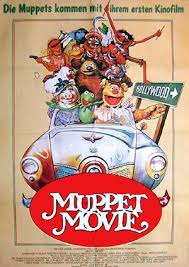
THE MUPPET MOVIE
UK, 1979, 97 minutes, Colour.
Voices: Jim Henson (Kermit the Frog, Rolf the Dog, Dr Teeth, Waldorf, Frank Oz (Miss Piggy, Fozzie Bear. Animal, Sam the Eagle), Jerry Nelson (Floyd Pepper, Crazy Harry, Robin the Frog, Lew Zealand), Richard Hunt (Scooter, Statler, Janice, Sweetums, Beaker), Dave Goelz (The Great Gonzo, Zoot, Dr Bunsen Honeydew), Carroll Spinney (Big Bird). Guest stars: Charles Durning, Austin Pendleton, Scott Walker, Edgar Bergen, Milton Berle, Mel Brooks, James Coburn, Dom DeLuise?, Elliott Gould, Bob Hope, Madeline Kahn, Carol Kane, Cloris Leachman, Steve Martin, Richard Pryor, Telly Savalas, Orson Welles, Paul Williams.
Directed by James Frawley.
The Muppet Movie is entertaining, of course. A pity we are so used to seeing the Muppets in their theatre, it takes an effort to adjust to them out in the world (even if it is that of the Hollywood or Bust dream screenplay). Kermit is as sympathetic as ever. Miss Piggy makes a big impact and provides the humour. Fozzie, Gonzo, Rolf are there. The guest stars are generally glimpsed saying one line. The story of the Muppets' origins is the old Hollywood dream (complicated by Charles Durning as Doc Hopper with his Fried Frogs' Legs cafes and villainy). Not always as sparkling as on television, but entertaining and despite Sam the Eagle, no socially redeeming values.
1. The appeal of the Muppets: characters, their world, entertainment, parody of humans? Their TV series and style? Expectations for the film? The change of expectations for a feature film?
2. How well do the Muppets transfer from the TV screen and the home viewing? Out of their own theatre? Having a narrative? Being on the road? The fantasy and reality? How well do audiences suspend their disbelief?
3. Panavision photography, the Hollywood studios, the travelling across the American continent? The world of American fast foods? The skill in presenting the complete Muppets, dancing, bicycling, driving etc?
4. The contribution of the score, the songs and their reprises e.g. 'Moving Right Along', Miss Piggy's song, 'Never Before', Rolf’s song about women? The songs exhibiting the characters e.g. Kermit's opening song?
5. The contribution of the guest stars, the brief glimpses of them, their one-liners and presence? Those who had more e.g. Steve Martin as the waiter, Mel Brooks as the mad doctor? The contribution of Doc Hopper and Max and their pursuit of the Muppets? Their henchmen?
6. The device of the Muppets arriving for the first screening of their film? The introduction to all the characters, the similarities to the TV e.g. Waldorf and Statler arriving and making cracks? The expectations of the film? The chatter, Kermit's introduction and Miss Piggy's insult? The humour of the chef showing the film and burning it? The end and the reactions, the photos and the interview and the chatter? The pleasure of seeing all the characters? Sam the Eagle and his moral comments?
7. The use of the Hollywood or Bust plot? Its cliche background and the way it was used? Humour, adapted to the Muppets, the difficulties of getting to Hollywood, the ease of their contract? To what age group was the film directed ? family audiences, children and their familiarity with the basic hackneyed plot and its conventions?
8. The appeal of Kermit as personality, as a frog, as leader? The introduction in the theatre, his singing in the swamp, the discussion with the agent and the jokes about the agent, his decision to go to Hollywood for the audition, riding his bike.
9. The satire on Doc Hopper and Max and the overtones of Kentucky Fried, Colonel Sanders and the fast food rackets? Advertising? Doc Hopper's offers, threats, his television advertisement, the billboard and the pie thrown, the pursuit in the cars, the kidnapping and the torture by the mad scientist, the hiring of the killers, the High Noon showdown? The exaggerated character of Doc Hopper? Max as the assistant and his finally warming to and warning the Muppets?
10. El Sleazo and James Coburn as the owner, Madeline Kahn and her being at the bar, Telly Savalas as her boyfriend, Paul Williams and his playing the piano, Carol Kane and her turning up as Miss or myth? Fozzie Bear and his performance in the bar, jokes, abuse, dancing with Kermit? The taking of his uncle's car and the driving along the American roads? The patriotic interlude and the praise of America? The humour of the sale of the car and Milton Berle's performance?
11. The arrival at the church, meeting Dr. Teeth and the Electric Mayhem, their discussing the screenplay, singing and the music, the painting of the car? Animal and the other members of the group? Their later arrival and rescuing the Muppets and taking them to Hollywood? The skill of the music, the humour of the characters?
12. The crash with the Great Gonzo? His joining the group with the hen? The carnival atmosphere, Bob Hope and the ice cream, Richard Pryor and the balloons? Elliott Gould and Miss Piggy and her crowning?
13. The introduction to Miss Piggy. her vanity, her song and the humorous parody of romantic interludes and commercials? Her eagerness to get in the car and go with the group to Hollywood, the dinner sequence and Steve Martin's humour as the insolent waiter. her abandoning Kermit, Rolf and his song and the consoling of Kermit, the humour of the kidnap, Mel Brooks as the mad scientist? Miss Piggy and her agent and disappearance? Her reappearance hitchhiking?
14. The appeal of Miss Piggy, her false glamour, her vanity, her preening herself, her realistic accent and bashing people? Her love for Kermit and use of him?
15. The build-up to the showdown in the western town, Doc Hopper's group? The humour of Bunsen and Beaker and their experiment and Animal's saving the day? The humour of the resolution of the problems?
16. The build-up to Hollywood, Lew Lord's secretary and her allergies, Lew Lord (and Orson Welles and Cloris Leachman's comedy styles), the rich and famous contract?
17. The Muppets' success, the desire to make audiences happy, their skill in representing various human types and parodying types? Their delight for audiences? The contribution of the group under Jim Henson's leadership for the variety of voices, personalities and styles? The dedication of the film to Edgar Bergen and his appearance with Charlie McCarthy? The delight of puppets in entertaining people?
Published in Movie Reviews
Published in
Movie Reviews
Tagged under
Saturday, 18 September 2021 19:32
Muddy River/ Doro No Kawa
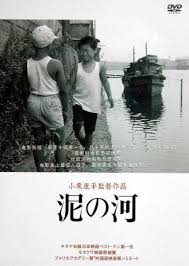
MUDDY RIVER (DORO NO KAWA)
Japan, 1981, 105 minutes, Black and white.
Nobutaka Asahara, Takahiro Tamura, Yumiko Fujita.
Directed by Kohei Oguri.
Muddy River (Doro No Kawa) is a beautiful and moving Japanese film. It is set on the river banks at Osaka in 1956.There are memories of World War Two and the growth of Japan in the post war period. The film focuses on a family running a shanty restaurant for workers on the banks of the river and on a family in a barge on the opposite bank. The mother in the barge is a prostitute who moves from place to place plying her trade.
While the film focuses well on the adults and their memories of a past Japan, the film presents the friendship between two nine year old boys with great sensitivity and meaning. The world view of the children is communicated very vividly as well as the puzzles about the adult world and the need for growing up with its sad disillusionments. The film, in black and white, creates atmosphere well as establishing relationships. While the film throws a great deal of light on Japan in recent decades, the film is readily accessible to a universal audience.
1. An entertaining and moving film of great quality?
2. The choice of black and white photography, the atmosphere of the river and of the city of Osaka? The world of the river bank: the shanty restaurant, the bridge, the barges, the boat? The visit to Kyoto, the festival, school sequences? The screenplay and photography immersing the audience in the world of the characters? An authentic world? Editing, pace? Contribution of the score? The song about the soldiers in Manchuria?
3. The title and its focus on the river, the symbolism of the river? The world of the river for old, young?Living on the river banks, and the river as a symbol of separation?
4. The period of the mid '50s and its style? World War Two, the war in China and memories? The effect on the Japanese of the war, building up Japan in the post war period? The background of Manchuria as communicated in the song? The Korean war? The quality of life, rich and poor? The film's focus on death as well as on the growth of the children?
5. The importance of the introduction to Shiodo and his horse, his talk, promise, the dramatic sequence of his death on the bridge? The mood of death? Nobuo and his response to the promise of the horse, his witnessing the death? The introduction of the theme of adult promises and their not being fulfilled; their effect on a child and his faith in adults?
6. The detail in the setting of the restaurant, the lifestyle, the work, the food, the customers and their talk? Nobuo's parents and their work? The genial atmosphere? A sense of propriety in the way Nobuo’s father ran the restaurant? Yet the memories of the war, Nobuo's father and mother meeting at the black market, his father deserting his wife, loving his second wife and son? Simplicity of life with emotional complications?
7. The contrast with life on the boat? Poverty? The father and his drinking and the pathos of his disappearance and death in the river? The mother and her working as a prostitute? The voice from the galley of the ship, her reputation, the response of her children, Nobuo forbidden to go to the boat? The wealth of her cabin and Nobuo's visit, his final glimpse? The men talking about the prostitute? The world of the poor and outcast?
8. Nobuo as the central character of the film? The focus of the narrative and of the themes? A genial young boy, a nine-year-old, his living so much alone, meeting the customers at the restaurant, love for his father and mother, the promise of the horse and his experience of Shiodo's death, the look of the horse at the time and its disappearance from the scene? His life of wandering the river banks, the bridge? The glimpse of him at school, looking out the window, going to watch television with his friends? The initial encounter with Kiichi and the discussion of the giant carp and glimpsing it? Their playing together? Nobuo's visit to the barge, his slipping in the mud and Ginko washing him? The mother's voice and her telling him not to go again? The world of a nine-year-old boy? His experience? Respect for his parents, growing in friendship, the visit to his father's wife and her reaching out to him? His facing up to the realities of life and death? The importance of the festival and his disappointment in his father? His needing to grow in trust?
9. The characterisation of Kiichi in comparison with Nobuo? A nine year old boy, a harsh life (and his memory of the classrooms and his having to leave, the honourable work that his father did, carrying cargo)? Friendship with Nobuo, sharing the view of the carp, the death of his father and seeming to take it with such calm, Nobuo's visit to the barge, Ginko and Kiichi's visit to the restaurant: good manners, his delighting in the food, the emotion in his singing the song, his being fascinated by Nobuo's father's trick and wanting it repeated, his delight in sharing the visit (and his sister treading on his toe and his mentioning this!)? The strong bond with Nobuo? Nobuo seeing him through the school window, giving up the television to be with his friend? The build-up to the festival, the money, the wonder of the sideshows, the decision to keep the money, the sadness of Kiichi's losing the yen, the intensity of their search? The sequence with the burning of the crabs and Nobuo's reaction against it? His glimpse of Kilchi's mother? His revulsion, passing Ginko, rushing home? His depression at the loss of friendship and his sense of betrayal?
10. The portrait of Ginko: her age, attractiveness, doing all the work for her mother, her washing Nobuo? Her sombre attitude towards life, the visit to the restaurant, stepping on her brother's toe, her courtesy, delight in wearing the dress but giving it back? The later sharing the bath and her laughing with Kiichi's comment on this? The losing of Nobuo's friendship?
11. The children's mother and her sitting in state on the boat, being only a voice, Nobuo's visit and her courtesy, her sending Ginko over to help in the restaurant when there was need, Nobuo's looking through the window and his disappointment? Her reaction to her husband's death? Her using her children? Their moving on?
12. The portrait of Nobuo's parents? the background of their story, the mother and her love for her son, worry about her husband? The father and his lost possibilities, giving his life to the restaurant, his reaction to his deserted wife? The messenger and the decision to visit her? The pathos in the hospital, her reaching out to Nobuo? Nobuo's mother coming and her apology? The promise of the father to take the children to the festival and his needing to go to the sea, arriving home late? The parents and their understanding of Nobuo's depression? Encouraging him to seek out Klichi again?
13. The brief glimpse of the children and school, the kids watching TV and cutting off Nobuo?
14. The world of children? innocence, friendship, joy? Hurt and sorrow?
15. Nobuo's depression, the boat going and his realising that he would lose Kiichi and the friendship? The poignancy in his desperate run, the bridges, the various glimpses of the boat, his calling Kiichi's name? The boat going further and further away? The loss of friendship and innocence?
16. A satisfying emotional experience? Story of Japan? Understanding of the Japanese?
Published in Movie Reviews
Published in
Movie Reviews
Tagged under
Saturday, 18 September 2021 19:32
Mrs Wiggs of the Cabbage Patch

MRS WIGGS OF THE CABBAGE PATCH
US, 1934, 80 minutes, Black and White.
Pauline Lord, Zasu Pitts, W.C. Fields, Evelyn Venable, Kent Taylor, Charles Middleton, Donald Meek.
Directed by Norman Taurog.
Mrs. Wiggs of the Cabbage Patch was a popular story of the '30s and '40s and was filmed with Pauline Lord, a stage actress, and remade with Fay Bainter in 1942. It is a mixture of Depression-optimistic story and sentiment. This version has its charm although would seem too sweet for a contemporary audience. However, the sequences with W.C. Fields are excellent and he's well-matched by Zasu Pitts. However, these sequences don't really mesh with the overall story of Mrs. Wiggs and her poverty and her children and good nature.
1. A popular story in the '30s and '40s? Its appeal now?
2. A story of the Depression, the tone of the Depression? A piece of Americana ? The blend of the ingredients of sentiment, humour, survival?
3. The wealth and poverty of the town itself? The Wiggs family, the people on the cabbage patch, the minister, the doctor? The wealthy family, Bob and his work on a newspaper, the tyrannical man who owned the ground on the cabbage patch?
4. How attractive a character was Mrs. Wiggs? Her goodness to all, her relationship with her children, her memories of Mr. Wiggs and her excusing him, her spinster neighbour and her friendship with her, her friendship with Bob and his fiance? Nice, naive, American charm and sentiment?
5. The children? the girls with their atlas names? Bill and his being the man of the house, the wood, the horse, the theatre tickets? Jimmy and his illness, the thanksgiving dinner, going to hospital, hearing about the theatre, his death and funeral? The pathos? The humour e.g. the girl and her holding her breath?
6. The initial focus on the thanksgiving dinner and the highlighting of the poverty and needs, the illness? The relief with the rich girl bringing the food and making the family happy? Their gratitude? The repetition of this theme with their going to the theatre and the humour of their response, the answering of the joke from the stage, thinking all was over at interval etc.? The switch of mood with Jimmy's illness and death? The focus on Miss Hazy and her courtship, her having to make the meal and win over her husband? The marriage ceremony?
7. The romance, Bob and his working on the paper, helping people, the girl and her wealthy family, antagonism? Bob and his help with Jimmy's illness, the buying of the theatre tickets? The happy reconciliation at the marriage?
8. The character of Miss Hazy and Zasu Pitts' comic style, the repressed spinster wishing for a husband, having his photo? W.C. Fields' comic style and his presentation of himself, age, looking over Miss Hazy, the meal, the proposal and the marriage, and the irony of his having to cook?
9. The mean owner and his hounding of the family, his harsh remarks at the theatre, the railroad deal and his finally being outwitted?
10. The various crises and the emotional impact, the thanksgiving dinner, Jimmy's death and funeral, Mr Wiggs' return?
11. The humorous critique of the irresponsible American man in Mr Wiggs? Mrs Wiggs praising him for his thinking, his irresponsibility, money? The happy ending with the buying of the house?
12. The impact of the humour and sentiment in its time? The gentle touch? The impact on audiences in the latter part of the 20th. century - a past view of a past world?
Published in Movie Reviews
Published in
Movie Reviews
Tagged under
Saturday, 18 September 2021 19:32
Mrs Sundance
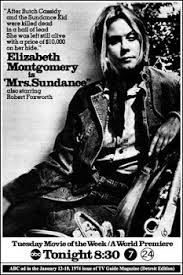
MRS SUNDANCE
US, 1974, 90 minutes, Colour.
Elizabeth Montgomery, Robert Foxworth, L.Q. Jones, Arthur Hunnicut.
Directed by Marvin J. Chomsky.
Mrs Sundance is a modest telemovie taking up the story after the deaths of Butch Cassidy and the Sundance Kid. Katharine Ross was Etta Place in the original film. Here she is Elizabeth Montgomery, an effective performer in many telemovies (including The Outlaw Belle Starr). She receives competent support from Robert Foxworth and, especially, L. Q. Jones as a bounty hunter. The story is slight, the running time short - but is easy entertaining western material. It does not particularly add to the legend.
1. Audience response to Butch Cassidy and the Sundance Kid? The legend? The reality? This telemovie as an appropriate sequel?
2. Telemovie techniques, intended audience? A western, characters, locations, atmosphere, action?
3. The film's presentation of the Butch and Sundance myths? Their being performed on stage? The origins of legends, their development? Relationship with reality? The American heritage, especially as seen through cinema representations of the outlaws?
4. Audience awareness of Etta Place? The stage show and audience reaction? The film's reality compared with the stage show?
5. Etta and her experience, her teaching, seeing her in action, watching the performance, trying to leave town, the encounter on the train? The encounter with the man on the train, his thinking her a boy, her turning the tables on him and taking over?
6. Etta's character, strength, skill with guns etc.? Using her wits, the chase and the pursuit? The dangers, friends along the way, the ambush? Eluding her pursuers?
7. Robert Foxworth and his enigmatic hero? Showing off, thinking Etta was a boy, the tables turned? The bounty hunter and the deal? The lure of Sundance in The Hole in the Wall? Sharing Etta's adventure? The effect on him?
8. Etta and Sundance, the story that he was alive, the lure of her back to The Hole in the Wall, the bounty hunter following her, the taking up of clues, the arrival at the cemetery, with everyone dead?
9. The siege, the truth, the violence, the confrontation? The deaths?
10. The portrait of the bounty hunter. skill, relentless, using people, using his wits, the shootout? The deaths of his associates?
11. The sketch of Etta Place's friends, their lending aid. the farmer and his wife and child and her resentment? The old man and his clues?
12. An average western, entertainment value, heroes of the West, the American heritage?
Published in Movie Reviews
Published in
Movie Reviews
Tagged under
Saturday, 18 September 2021 19:32
Mrs R's Daughter

MRS R's DAUGHTER
US, 1979, 100 minutes, Colour.
Cloris Leachman, Season Hubley, Donald Moffat, John Mc Intyre, Steven Elliott, Ron Rifkin.
Directed by Dan Curtis.
Mrs R's Daughter is one of many films, especially telemovies, of the '70s, focusing on the rape situation in the United States and subsequent court proceedings. The film is a strong criticism, allegedly based on fact, of delays and injustices in judicial processes. Other films of the '70s include A Case of Rape, Cry Rape and Lamont Johnson's vigorous Lipstick with Margaux Hemingway, Chris Sarandon and Anne Bancroft. This film focuses on a determined mother trying to get justice for her daughter.
Cloris Leachman is strong and passionate in the role. Season Hubley is more quietly effective as the victim daughter. Direction is by Dan Curtis, producer and director of many 1970s adaptations of horror classics including Dr. Jekyll and Mr. Hyde, Dracula. He directed the autobiographical When Every Day Was The Fourth Of July and moved into miniseries with The Winds of War. The film is quite powerful, though familiar television social movie material.
1. A satisfying telemovie? Its emotional impact? Its helping the home audience to understand the rape situation? Judicial systems? A sense of frustration at the experience of the central characters?
2. The adaptation of the story for the television audience? Strong material? Serious communication of a serious theme? Credibility? Emotional validity? The viewpoint of the screenplay?
3. The film as a piece of Americana? An American experience, police, justice, violence? Its relevance to other countries?
4. The situation as the audience saw it? Ellie and her condition at the opening of the film? Reaction to Carl? To Andy? Emotional outrage at her condition? The introduction to Ruth and her husband? Their social background? The set-up for an emotional response to the characters and their treatment?
5. The hospital, Ellie's treatment, concern, damage? Her parents' reaction?
6. The police and their work, questions, arresting Carl, charging him? The revelation of Carl's record? The loophole with the possibility of his being bailed by his mother? The probation officer and the seeming frustration ? yet his waiting for Carl? The prosecution and defence and their roles? The changes in the personnel for prosecution? The growing delays, holidays and the reprogramming of trials, Carl's not coming to the court? The taking of evidence? Ruth's interrogation of the other victims and persuading them to testify ? with mixed success? New cross examinations? The nature of the ordeal for Ellie, for Ruth? The final discussions with the District Attorney? The new trial? The time taken for the trials? Emotional draining? Blame? Ellie and her responsibility, the questioning of her motives? Ruth's desire for Carl to get the full punishment? The overreaction of Ruth and Ellie's asking her 'Who was raped?' The final sentence, but the prospect of Carl's being free eleven years later and possibly pursuing the family?
7. Ellie: family background, mother's divorce and remarriage, the bond between them, her going away, feeling her mother smothered her, working in the record shop? The relationship with Andy? The encounter with Carl? The ordinary day, the drive, her experience and terror, the gun, the bashing, the burns? Her escaping? Hospitalisation and injuries? Her willingness to be cross examined? The experience in the courts? The confrontation with Carl? The time dragging on?
8. The portrait of Ruth? the competent mother? Remarriage? Devotion to her husband? His constant support during the trial? Her reaction to the police? Visiting the probation officer? Getting evidence? the garage man, going to Andy, Andy's girlfriend? The various people giving her help? Carl's arrest? Her growing fury? The District Attorneys, the change of personnel and her reactions? Their busyness and their not being briefed sufficiently? Her asking for full justice? Pushing Ellie? Ellie turning against her mother because of the smothering experience? The antagonism towards Carl and wanting the full penalty? The final vindication?
9. Carl and the audience's initial reaction to him? His psychotic nature? The psychological analysis and the testimony of the psychologist? The District Attorney's questions about responsibility, madness, drinking? His mother in the court and her hold over him? Carl well-dressed, his behaviour in the court? His final condemnation?
10. The minor characters ? Andy and his friendship, testimony, lack of co-operation? The help of his girlfriend? The garage owner and his collaboration?
11. The portrait of the defence counsel ? his skills, cross examinations, support of Carl? The handling of the case? and his treatment of Ellie? The comparisons with the prosecutors? The judges?
12. Audience interest in trial proceedings with their theatrics, tension in cross-examination, the nature of evidence and the limitations of describing what happened?
13. The film's insight into men's and women's relationships, the reality of rape, the reasons for rape? The attitude of the courts - towards the victim, towards the perpetrator? The value of this kind of telemovie for raising social consciousness in the home audience?
Published in Movie Reviews
Published in
Movie Reviews
Tagged under
Saturday, 18 September 2021 19:32
Mrs Parkington
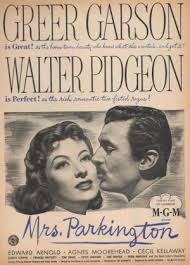
MRS PARKINGTON
US, 1944, 124 minutes, Black and white.
Greer Garson, Walter Pidgeon, Edward Arnold, Cecil Kellaway, Agnes Moorhead, Gladys Cooper, Tom Drake, Peter Lawford, Lee Patrick, Dan Durea, Selena Royle, Hugh Marlowe.
Directed by Tay Garnett.
Mrs. Parkington is a Greer Garson- Walter Pidgeon vehicle. After their success in Blossoms in the Dust and Mrs. Miniver, they went on to make Madame Curie and a number of films which capitalised on their easy relationship with one another and Greer Garson's elegant qualities as a leading lady. This is an adaptation of a novel by Louis Bromfield (The Rains Came) and is an entertaining saga of an American family.
The film has the M.G.M. production values of the '40s ? and presents an entertaining saga (compared with the rather more lurid novel adaptations of the late '50s and the subsequent mini-series on television). There is an excellent cast many stars in the early years of their careers taking supporting roles. There is a score by Bronislau Kaper.
Not an outstanding film, but an entertaining piece of '40s Americana.
1. An entertaining film? Adaptation of a popular novel? The tradition of large novel adaptations to blockbuster films? The tradition of portraits of families? from cinema adaptations to miniseries? The popularity of the novelist in the '40s?
2. M.G.M. production values? Black and white photography? Period? The musical score? The quality of the cast?
3. The structure of the film: the status of the family in 1938, the flashback technique and its effectiveness, the running of the two plots?
4. The popularity of Greer Garson? Her image, her winning an Oscar? Her ladylike values and style? Her presentation as the matriarch of the family, the flashbacks and her youthfulness? Her carrying the family? An old woman ? family, the meal, money? Amory? The granddaughter and Ned? The shooting? The loan, jail? The finale? American families and tradition, honour, wealth? Money, expectations and greed?
5. The portrait of the members of the family? The reliance on stereotypes well acted? Alice and the drinking? Awry and his wife? Al Swann? The meeting, the talk, the refusal? The critique of the family?
6. Susie and the background of Nevada, of the house, her relationship with the major, friendship, love., disaster? The importance of position, wealth? The atmosphere of the Parkington family?
7. Marriage. the change to New York, the relationship with Aspasia? The house, the ball, the list? The appeal? Changes? Susie and money? The building of the families?
8. Mrs. Parkington in middle age? Deaths? England and Lady Norah? The Prince of Wales? The hunt and the talk with the prince?
9. Aspasia and friendship. love, hate, help. persuasion about England? Leaving?
10. The film as a portrait of an outstanding woman? A woman in America? The contrast with English background? The portrait of the major in comparison with his wife? His death?
11. The film as a piece of Americana? American values, success, dreams, opportunities, exploitation? The film's impact in the '40s? Later?
Published in Movie Reviews
Published in
Movie Reviews
Tagged under